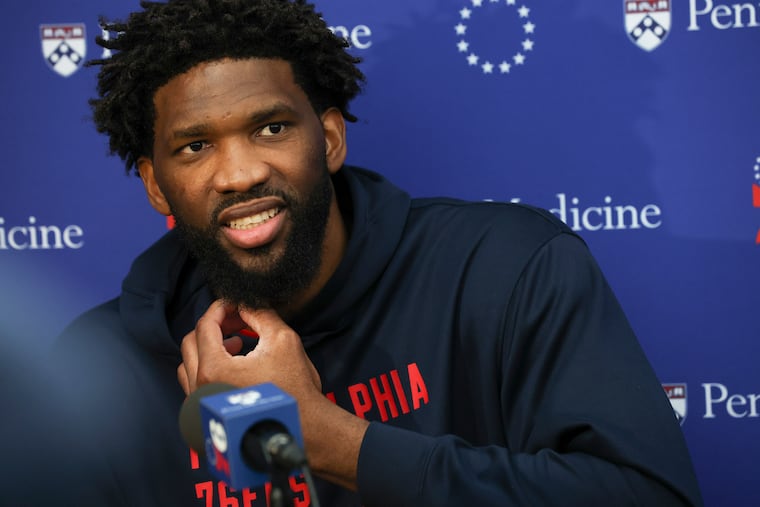Joel Embiid wants to come back to save the Sixers. He needs to come back to save his legacy.
No one can deny anymore that a healthy Embiid is as great as it gets in this era of pro basketball. But he still has something more to prove.

Every time Joel Embiid speaks about his place in the NBA, he makes it clear how much he cares about his place in the NBA. The 14 minutes he spent Thursday answering questions at the 76ers’ headquarters in Camden reaffirmed as much. Yes, he feels good after the surgery in early February that repaired the injured meniscus in his left knee. Yes, he wants to play again this season. No, he doesn’t know if he’ll be able to play again this season. The desire to play and the chance to remind people what kind of player he had been before the surgery seem to be driving him, as if he has something more to prove. Which he does.
No one can deny anymore that Embiid, when he is healthy, is as great as it gets in this era of pro basketball. A Most Valuable Player award. Two scoring titles. The erasure of any second guesses over whether the Sixers should have taken a relative chance on him in the 2014 draft. All from a center at a time, at least when Embiid entered the NBA, when Steph Curry and the rest of the league’s long-distance shooters and analytically driven executives were pulling the sport away from the rim. But there are always those pesky caveats with him, and When he is healthy is the peskiest.
» READ MORE: Roman Catholic’s PCL championship meant the world to Sixers analyst Marc Jackson and his sons
The discussion of any famous athlete’s “legacy” is nothing more than an answer to this question: What is the first thing you think of when you think of that athlete? For every day that Embiid doesn’t practice, for every game that he misses, that answer tilts further away from his tangible achievements and closer to the things he might have achieved. It’s no wonder that he wants so badly to get back into the Sixers’ lineup, even as they fade into the background of the Eastern Conference playoff picture. It’s no wonder that, despite the gobsmacking season he was having — more than 35 points a game, a field-goal percentage of 53.3%, a free-throw percentage of 88.3%, a 70-point game — he insisted Thursday that he hadn’t been at full strength for the two months before his surgery.
“I wasn’t at my best,” he said. “I still believe as a basketball player I can be way better than even the level I was playing at. I have a lot of confidence in myself. I also feel like I can bring a lot of things to the team as far as my impact on both ends of the floor. I always believe it doesn’t matter who’s on the roster. It doesn’t matter who’s coaching. I still believe I have a chance to win, no matter the situation.”
Of course he believes that. Any player of his talent and stature would. And from the Sixers’ standpoint, it had to be so reassuring to hear him endorse the moves that team president Daryl Morey made at this season’s trade deadline. Those weren’t changes to help the Sixers in the here and now as much as they were to help them next season and beyond. So Morey, Nick Nurse, and the rest of the franchise’s power people can breathe a sigh of relief that Embiid sees the sense in adding Buddy Hield — a bona fide floor-spacing shooter — and making sure the Sixers have enough salary cap space and flexibility to reload in the offseason.
» READ MORE: The Sixers’ failure to mine Villanova for talent, Travis Konecny’s value to the Flyers, and more
“I was like, ‘Man, I wish I was playing,’” Embiid said, “because I was so excited because I feel like Buddy, the way he’s playing, I just felt like I could help him even more.”
Given the current state of the Sixers, Embiid could take his time rehabbing, make no push to play again this season or for the United States at the Summer Olympics in Paris, and no one would begrudge him. But he’s still planning to suit up for Team USA in the Olympics: “If I feel good, I’m playing. If it doesn’t feel right, then we’ll have to make those tough decisions. But the plan is the plan.” And the plan includes his returning to the Sixers as soon as possible — late March? April? May? — and trying to salvage their season.
“I just love playing basketball,” he said. “I want to be on the floor as much as possible. I only have about 20 years to do this, so any chance I get, I want to be on the floor. It doesn’t matter where we are. I don’t know — four, five, three, seven, eight, nine, 10, 11th. It doesn’t really matter where we are. I want to play as much as we can and try to help us.”
It’s more than that, though. This injury devastated him. “A tough one,” he said. “I was really disappointed in everything that happened. Got to hang in there. No one is going to feel sorry for you.” No, no one will. What they will do — and Embiid knows this — is tally up the glorious moments of a great athlete’s career, measure them against the failures and the heartbreaks and the might-have-beens, and judge him on the final score. Which means Joel Embiid still has a hell of a comeback in front of him.